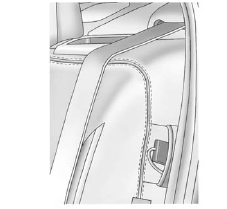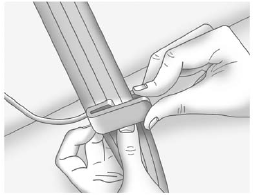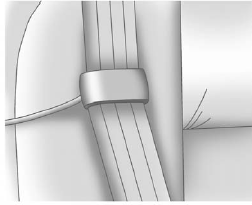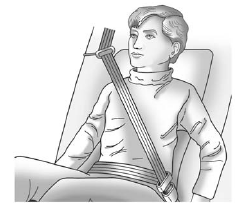Rear Safety Belt Comfort Guides
This vehicle may have rear shoulder belt comfort guides. If not, they are available through your dealer. The guides may provide added safety belt comfort for older children who have outgrown booster seats and for some adults. When installed and properly adjusted, the comfort guide positions the belt away from the neck and head.
There is one guide for each outside passenger position in the rear seat.
Here is how to install a comfort guide to the safety belt:

1. Remove the guide from its storage pocket on the side of the seat.

2. Place the guide over the belt, and insert the two edges of the belt into the slots of the guide.

3. Be sure that the belt is not twisted and it lies flat. The elastic cord must be under the belt and the guide on top.
WARNING!
A safety belt that is not properly
worn may not provide the
protection needed in a crash. The
person wearing the belt could be
seriously injured. The shoulder
belt should go over the shoulder
and across the chest. These parts
of the body are best able to take
belt restraining forces.

4. Buckle, position, and release the safety belt as described previously in this section. Make sure the shoulder portion of the belt is on the shoulder and not falling off of it. The belt should be close to, but not contacting, the neck.
See also:
Fuses and Circuit Breakers
The wiring circuits in the vehicle are
protected from short circuits by a
combination of fuses and circuit
breakers. This greatly reduces the
chance of damage caused by
electrical problems.
...
What to Use
Use a mixture of one-half clean, drinkable water
and one-half DEX-COOL® coolant. If you use
this coolant mixture, you do not need to add
anything else.
CAUTION:
Adding only plain water to your ...
Engine Drive Belt Routing
4.2L V6 Engine
5.3L V8 Engine ...


